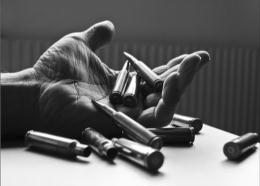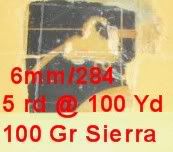

 The Accurate Reloading Forums
The Accurate Reloading Forums  THE ACCURATE RELOADING.COM FORUMS
THE ACCURATE RELOADING.COM FORUMS  Rifles
Rifles  Small Calibers
Small Calibers  Rifling rate?
Rifling rate?Go  | New  | Find  | Notify  | Tools  | Reply  |  |
| One of Us |
What is a good twist rate to use with a 6mm bullet in the 85- to 110-grain (approximate) weight range? | ||
|
One of Us |
9" /////////////////////////////////////////////////////////////////////////// "Socialism is a philosophy of failure, the creed of ignorance, and the gospel of envy, its inherent virtue is the equal sharing of misery." Winston Churchill | |||
|
| One of Us |
I was lead to beleive that an 8 twist was necissary for heavy VLD bullets like the 107 grainers and so on w/ 6mm. Berger's website lists their reccomendations for rate of twist. | |||
|
| One of Us |
You need a faster twist yet (7) to handle the newer 115 grain bullets. | |||
|
| One of Us |
It's going to be a target gun. I am a Sierra fanboy; that 107gr MatchKing has my name all over it. 1:7 or 1:8? | |||
|
One of Us |
Once again, required twist rate is determined by BULLET LENGTH not weight! For example, the original .244 Remington, with a 1/12" twist would stabilize 100-grain bullets just fine, IF they were the short round-nose type - but if you switched to spitzers, it would NOT do it. I have a 1/10" 6mm/284, and it does very well with all .243" bullets from the 85-grain Sierra HPBT up to and including the Speer 105-grain spitzer.  You can use the Greenhill formula to determine what twist you need fopr that 107-grain bullet. Measure the length of the bullet, and convert that measurement to calibers by dividing the o/a length by .243... Req Twist (in CALIBERS) = 150/bullet length in calibers. Very simple! Let us say, for illustration, that your bullet is 5 calibers long. 150/5=30. 30 X.243 = 7.29", so a 1/7" twist will do it, and then some. A 1/8" would be mnarginal, unless your bullet is shorter than 5 calibers. "Bitte, trinks du nicht das Wasser. Dahin haben die Kuhen gesheissen." | |||
|
| new member |
Ok, I'm trying here . . . 95 gr sierras i just got in are 1.2" in legnth. Now is where i dont under stand the equation. 1.2" / .243 equals 4.93? Help! What am i reading wrong? | |||
|
| One of Us |
Ask someone who knows. I.e., your barrel maker. Ask David Kiff. People who do this every day, for money. flaco | |||
|
| one of us |
flaco wrote: "Ask someone who knows...People who do this every day, for money." Just because someone does it for money doesn't mean they are the end-all for correct information. As an example, there's one current custom maker who vehemently insists a 1:14 is the optimum twist for the 6mm-.223, 6mm TCU, etc. with bullets from 55-90 grains. As someone who has poured thousands of rounds down the tubes of the little 6mm wildcats, I can tell you that's pure hogwash and that a 1:10 or even a 1:9 is needed. (Most of mine have been 1:10 for shooting flat-based 80s, but a 1:9 is an even better proposition for the likes of the 80 grain Ballistic Tip and similar projectiles.) Within reason, one can't overstabilize a bullet, but you sure as heck can understablize one. As to homebrewer's question, I'd opt for a 1:8 unless you planned on shooting the 115 grain VLD types, and then a 1:7 would be in order. Bobby Μολὼν λαβέ The most important thing in life is not what we do but how and why we do it. - Nana Mouskouri | |||
|
| one of us |
I've never had a 6mm rifle build for both standard/VLD bullets but I agree with Flaco I'd be talking to the barrel manufactor as they get alot of feed back. VFW | |||
|
| One of Us |
Here is a website that has a barrel twist calculator. It also takes into account the velocity of the bullet. http://kwk.us/twist.html Red C. Everything I say is fully substantiated by my own opinion. | |||
|
| One of Us |
The actual rifling twist needed to stabilize a bullet is determined not by weight or length, but rather the ratio between the center of gravity and the center of pressure. Weight and length affects these two, but aren't necessarily predictors. Velocity also plays a part, the faster the bullet leaves the bore, the faster the bullet is spinning (in RPM) so a slower twist rate could be used. This is why .223 use 1-12 for 50 gr where as a .22-250 uses a 1-14. As for Sierra bullets, all of their match kings give a reccomended twist rate. Make sure you are loading them for their intended velocity as well. Now for the bonus question, why does a spinning bullet stabilize? John | |||
|
| Powered by Social Strata |
| Please Wait. Your request is being processed... |
|

Visit our on-line store for AR Memorabilia

